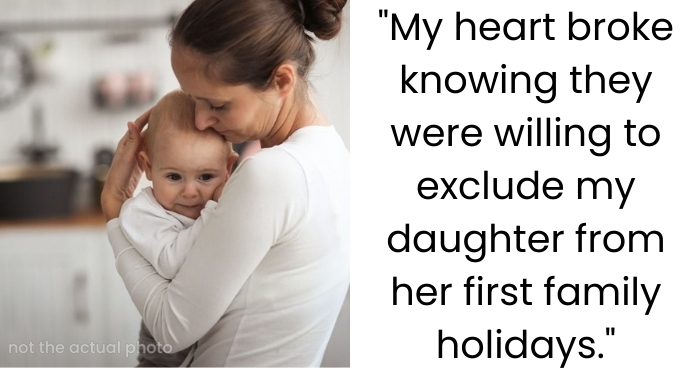‘AITA for being hurt that my MIL wanted to exclude my daughter from Thanksgiving and Christmas to protect my SIL?’
A 31-year-old woman is heartbroken about this as her mother-in-law (MIL) said way in to cut this woman and her three-month-old baby out of the family Thanksgiving + Christmas celebrations to allow time for SIL Ashley who is not getting pregnant and just lost one. The person who posted this (OP) is emotionally bonded with her husband’s family more because Lost her own Mother two years ago. While the MIL means well OP feels that her suggestion that the baby need miss bonding moments isn’t okay and she understands Ashley’s pain.
OP’s husband is firmly on her side, and wants her and their kids included, but by getting Ashley first, MIL put the ball back in OP’s court in terms of what her family is forced to do, gave OP less emotional room to put her foot down, and made OP wonder what happens when she can’t win over the little angel. Op’s trust and feeling of belonging has been shattered even though MIL has regrettably handled things differently ever since.
Read for more info Reddit


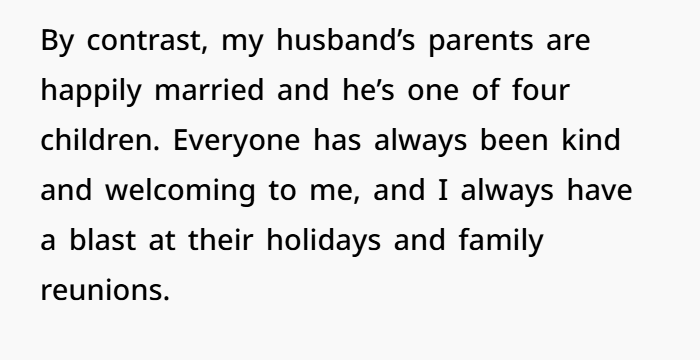








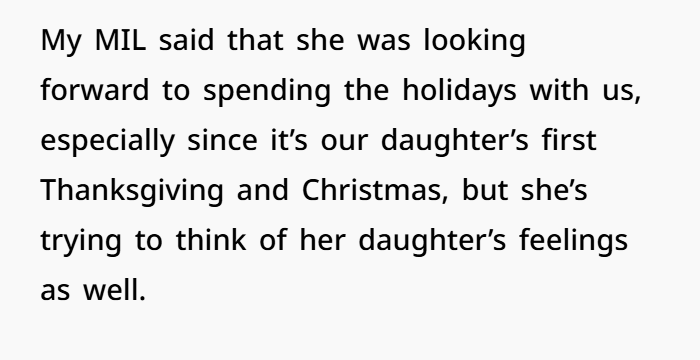








Walk the line between compassion and exclusion:
While the story highlights the reality of caring for family in need, including an extended family, it also illustrates the razor-thin line between that care and turning people away. Research illustrates that infertility can provoke feelings of grief, solitude, and even hostility towards those who can bear children—profoundly emotional consequences of a lifelong process. SIL is understandably hurt, but asking OP and her baby to skip family holidays means favoring SIL’s needs at the potential expense of OP and her family’s inclusion on important occasions, which is detrimental to healthy familial dynamics.
Family counselors will recommend “both/and” solutions in which one family member’s struggles are legitimately acknowledged while instead of escalating into a “one or the other” equation that splits up and invalidates the family as a unit. Adjustments should be made, however—like focusing on things they can do together outside of the baby—so Ashley can still feel supported without OP and her daughter being marginalized from the equation.
Why Not to Exclude:
Then there are the legal and ethical considerations, but that is beyond the family–this is a family issue. Not allowing a mother and baby access to holiday gatherings communicates that they are lesser. In an ethical family, everyone is treated fairly and with mutual respect — no one feels less than. Some Family Estrangement Studies Show How Exclusion During Formative Years Often Breaks Long-term Bonds. This will result in OP having even lasting mistrust not only from MIL but to Ashley as well.
Story Comparisons:
In culture columns and advice columns alike, tensions have occurred over similar stories.
For example:
One family left out a sibling with a newly-recruited partner so as not to upset an ex-spouse, creating a rift in family trust.
A wife whose child’s presence was not welcomed at her brother-in-law’s spirited wedding to avoid “distractions” asked her husband not to attend and the resentment continued into the new marriage.
In each situation, the real problem was the inability to shape a compromise that respected everyone place within the family. The solutions included frank conversations, facilitated discussions, and in some instances, professional counseling.
Children get affected:
They would hardly get that time to get bonded with their close relatives who mostly live in other regions, thus having a less stiff family bond. But for OP who has no other family, these initial interactions are really important. When MIL suggested she would “bond when I get back” and referred to “future opportunities,” this could have felt like she was minimizing OP’s need for some bonding time as a new mother and her wish to create good memories for her child.
Here were the top rated comments from readers in response to the OP’s post:



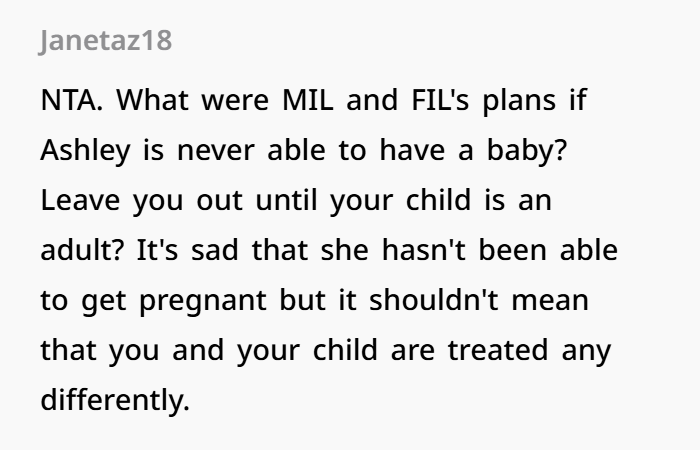
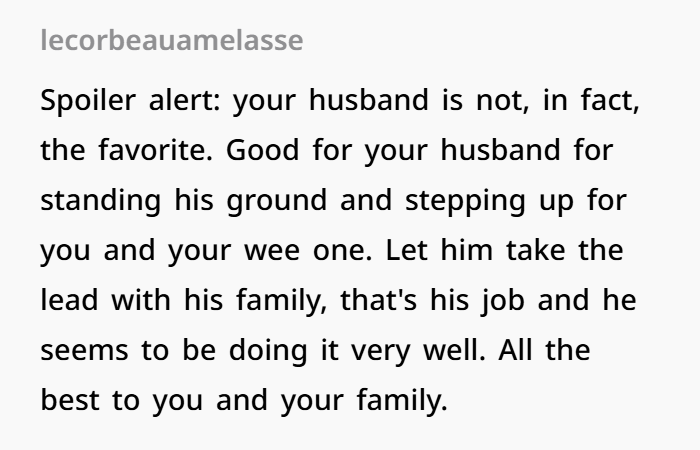
Ashley has every right to feel hurt but expecting OP to not involve her baby in these significant life events is selfish and favors one family member’s feelings over another’s. OP has been unbelievably considerate in not talking about getting pregnant and refusing a baby shower, but asking to have a different kind of shower and then having it make OP feel like she isn’t valued in the family is just too much. MIL seems to have backtracked a little, which shows she knows she overstepped; but op is not wrong for being hurt!
Suggestions:
Speak Up: Have a conversation with MIL when both of you are calm to tell her how you feel but in an understanding way to Ashley. Express why this request seemed to be creating a division, and discover how you can meet both Ashley, as well as your family in their inclusion needs.
Family Therapy— Suggest that Ashley has a neutral third party with expertise in existing family dynamics to discuss setting parameters for inclusion along with Ashley herself.
Alternative Celebrations: If reconciling does not seem possible right now, think about creating your own Thanksgiving and Christmas traditions with your husband and baby. Bring along more or less together family, who u will use go watch yet again your remaining growing loved ones achieving greatness.
Ultimately, family bonds work best when you treat each other as valued and respected member of the family, even bluntly, during a hard time.

